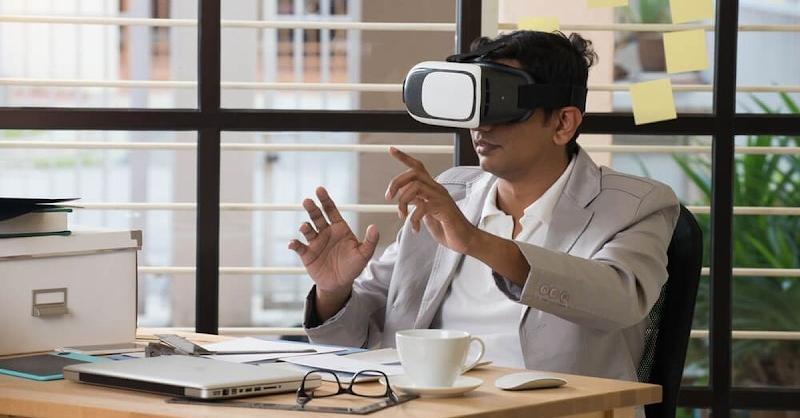In a world where technology constantly shatters space and time barriers, Virtual Reality (VR) is emerging as a bridge to endless possibilities in corporate event participation. Attendees can enter carefully constructed digital landscapes at the touch of a finger, providing a new and exciting interaction domain beyond the norm. Virtual reality (VR) is an innovative technology that helps businesses create more personal interactions with customers worldwide. Introducing VR to business events is more than just the latest fad; it ushers in a revolutionary new era of fully immersive participation.
The Big Picture
Due to technological advancements and societal norms shifts, business events have seen a dramatic transformation in recent decades. Virtual reality (VR) has opened up previously unimaginable possibilities for traditionally constrained events. VR corporate events have changed the game for business events by providing a new dimension of flexibility regarding location. Virtual reality is a game-changer for business events since it creates a new medium for creative communication and networking. This technological advancement mirrors the ever-changing character of the business world and paves the way for a more diverse and exciting event experience, launching the sector into the future.
Pros of Using Virtual Reality at Work Events
Virtual reality (VR) has several potential applications in the business world. One of the most noticeable changes is increased participation and communication between event attendees. Moreover, virtual reality is cost-effective since it reduces logistical and venue costs and encourages remote attendance, which reduces travel expenses. And because of VR’s ability to bridge physical distances, it can provide experiences that are accessible to people of all abilities. Companies can take a step toward a more engaging and inclusive corporate culture by adopting VR, which modernizes the dynamics of events and lays a solid platform for establishing meaningful connections, reducing expenses, and ensuring inclusivity.
Examples of Use: Virtual Reality in Use
Virtual reality (VR) has a significant impact on corporate events, and VRE, based in the UK, is a leader in this area. VRE is an industry leader in developing immersive virtual reality environments, successfully transforming boring corporate events into engaging VR worlds. As users explore VR environments, interact with one another in real time, and network in novel ways, businesses see a huge rise in engagement thanks to these bespoke solutions. The achievements of VRE are an encouraging example of how technology can be used to promote meaningful relationships and memorable experiences in a business setting, and they also highlight the potential of VR to revolutionize corporate events.
Conquering Difficulties
The general public’s mistrust of virtual reality (VR) technology is one obstacle to its widespread use in business functions. The possibility of disconnection from the working environment and the associated privacy problems cast a pall of doubt over virtual reality. The key to calming nerves is ensuring everything goes off without a hitch. In addition, encouraging a sense of belonging and familiarity in online spaces helps reduce anxiety. Successful adoption depends on all stakeholders being able to put their reservations about the technology to rest through open dialogue, strong privacy protections, and user-friendly interfaces.
Developing Tendencies
Virtual reality (VR) in the events industry is predicted to go from passive spectatorship to active participation and immersive exploration shortly. Here are a few forecasts and current tendencies:
VR (Virtual Reality) and AR (Augmented Reality) technologies are on the cusp of revolutionizing the virtual events industry by making them more interactive and immersive. They will make it possible to make virtual tours and AR overlays, increasing participation and interaction.
New developments in virtual and augmented reality point to the widespread adoption and incorporation of these technologies in various fields, including events.
Trends in Extended Reality (XR) The sphere of XR, which includes Virtual Reality (VR), Augmented Reality (AR), and Mixed Reality (MR), is witnessing numerous advancements as a result of the growing interest in the metaverse. These tendencies indicate that remote events are becoming increasingly realistic and mixed reality.
Trend Towards More Virtual and Augmented realities-Integrated Event Industry The COVID-19 epidemic has catalyzed the adoption, innovation, and acceptance of VR and AR technology in virtual events.
These forecasts highlight the potential of VR and related technologies to radically alter the structure and nature of corporate and other events, providing participants with richer, more participatory, and more memorable encounters.
Conclusion
Virtual reality (VR) is on the edge of transforming business events by breaking down barriers and providing more value for attendees at a lower price point. The success of VRE and the reduction of social concerns demonstrate that the potential of VR is becoming more concrete by the day. The future of corporate event planning looks bright, thanks to technical developments in virtual reality and related fields. As we explore this new territory, incorporating VRinto events can greatly improve attendees’ overall impression of the gathering and usher in a new era of innovative, engaging, and immersive corporate engagements.

